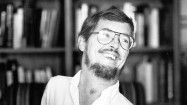“The reconstruction of a useable past can contribute to the building of an accessible future.”
It was pouring rain in Sam Francisco on Sunday morning and still pouring when K. and I came above ground at the downtown Berkeley Civic Center Market St.
UCB faculty, San Francisco State University
A few days ago, I was talking with a friend about coming to my first Write To Connect workshop, which is this Friday. C. and I have not known each other all that long and she said to me, kind of nervously, “Ok, I’ll come, but as long as you know I am not the type to write a disability memoir…..” I laughed and told her that that is exactly the sort of thing I would NOT want her to do, because I know it is not her style. I guessed she had the being-inspiring phobia. But I told her that some of the students would be interested in writing autobiography and I was very much looking forward to working with them too.
As I listened to the readers at Paul’s Berkeley
By “myth” Paul meant the gracious and charming façade of what he calls “the uncomplaining overcomer”. He described himself as a young man, spending so many valuable moments of his time trying to choreograph the small interactions he would have with fleeting people, like cashiers, clerks, etc. He would try to be very poised in his demeanor, very witty—to overcompensate for the phsycial fact of his disability. And even when he realized this was absurd, he still kept up the effort.
In the Disability History Project, he also said,
Inspiration—we all fight being inspiring for good reason. If I am much more inspiring, I am going to come down with a secondary disability—diabetes. It is just so cloying and saccharine. But the fact of the matter is also, that disabled people like everybody else, need role models and heroes, which is not to say we should write politically correct her stories.
And he added an example of a woman who is a hero to him, a friend and mother of four, who lives an everyday life with tenacity and honesty. He relied on her for her matter-of-fact advice about any number of things, like his ongoing battle with the Social Security Administration.** His point was, seemingly, that being heroic needn’t be a grandiose or instructive story, but that we need disability stories, whatever form they take.
In Why I Burned My Book and Other Essays, Paul wrote, “The reconstruction of a useable past can contribute to the building of an accessible future.”
I want to use Write To Connect as a space where people can shape their pasts—and their present—into something useable. And, whether that pertains to artistic beauty, strong syntax for civil rights, precise words for personal views—that use is up to each student to discover and define for themselves. I think that the act of writing together, in small groups, as a community, is “inspiring”, in that it refreshes the spirit and leads to individual self-determination.
Thank you for your words Paul, and thanks to those who hosted the memorials this weekend.
*If you are not familiar with Paul Longmore, core founder of disability studies and a renowned disabled historian, check out his books online and ask me about him at Write To connect. I can point you to some resources online. Paul died unexpectedly in August.
**Due to a monumental public demonstration on his part, Paul chnaged a Social Security Administration policy that threatened to deprive him of government benefits for his in-home assistance and his ventilator. Because he would receive modest royalties from an academic book he published, SSA was going to pull his benefits. Then, just before he died, he had to turn down a grant to write another book, because he found out that the Longmore Amendment he brought about did not extend to grants. If you are interested in this issue, please ask me in class. A petition is circulating.

